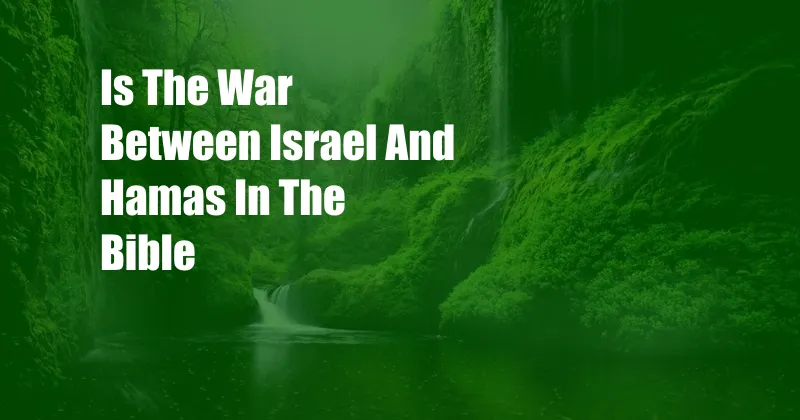
Is the War Between Israel and Hamas in the Bible?
Have you ever wondered if the ongoing conflict between Israel and Hamas is mentioned in the Bible? This intriguing question has sparked many theological debates and interpretations, with some claiming that the conflict is a fulfillment of ancient prophecies. Let’s delve into the topic and explore the perspectives surrounding this matter.
The Biblical Framework
The Bible, a collection of sacred texts, offers guidance and insights into the history and destiny of humankind. Within its pages, we find numerous accounts of wars, conflicts, and political struggles. However, there is no explicit mention of the specific conflict between Israel and Hamas in the Bible. This absence does not necessarily mean that the conflict is unrelated to biblical teachings, but rather opens up the possibility for different interpretations.
Prophecy and Interpretation
Some scholars have suggested that the war between Israel and Hamas can be seen as a fulfillment of certain biblical prophecies regarding the end times. Passages like Zechariah 12:2-4 and Ezekiel 38-39 describe future conflicts in the Middle East that involve the gathering of nations against Israel. While these prophecies do not explicitly name Hamas, some interpreters believe that they could refer to the ongoing conflict.
Historical and Political Context
It’s essential to recognize that the conflict between Israel and Hamas is a complex historical and political issue. The establishment of the state of Israel in 1948 created tensions and clashes with the surrounding Arab states, leading to several wars and ongoing border skirmishes. The rise of Hamas as a political faction further complicates the situation, adding layers of religious and ideological motivations to the conflict.
Interfaith Dialogue and Peacemaking
Despite differing perspectives on the biblical basis of the conflict, interfaith dialogue remains crucial for promoting peace and understanding. Religious leaders and scholars from both sides have engaged in conversations to bridge the divide and seek common ground. Calls for a ceasefire, humanitarian aid, and a just solution that addresses the needs of both Israelis and Palestinians continue to resonate in the international community.
Tips for Understanding the Conflict
Navigating the complexities of the conflict between Israel and Hamas requires open-mindedness, critical thinking, and a willingness to listen to diverse perspectives. Here are a few tips to enhance your understanding:
- Objectivity: Seek information from reliable sources that present a balanced viewpoint, avoiding bias or sensationalism.
- Historical Context: Study the historical roots of the conflict, including the region’s demographics, land disputes, and geopolitical developments.
- Religious Perspectives: Understand the religious beliefs and interpretations that influence the actions and attitudes of both sides.
FAQ on Biblical and Historical Context
Q: Does the Bible explicitly mention the war between Israel and Hamas?
A: No, there is no direct mention of the current conflict in the Bible.
Q: How do some scholars interpret biblical prophecies in relation to the conflict?
A: Some claim that prophecies concerning end-time conflicts may be seen as foreshadowing the ongoing tensions between Israel and surrounding nations.
Q: What historical events have shaped the conflict?
A: The establishment of Israel, wars with Arab states, the rise of Hamas, and ongoing border disputes have all contributed to the complexity of the situation.
Conclusion
The relationship between the war between Israel and Hamas and the Bible is a subject of ongoing debate and interpretation. While there is no explicit mention of the conflict in the Bible, some scholars find parallels in biblical prophecies. Ultimately, understanding the conflict requires a multifaceted approach that considers historical, political, and religious factors. Open dialogue, peacemaking efforts, and a commitment to objective understanding are essential in promoting a just and peaceful resolution.
Are you interested in learning more about the connection between the Bible and current events? Share your thoughts and questions in the comments below.